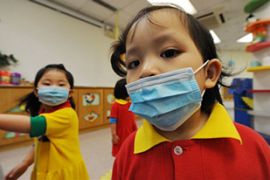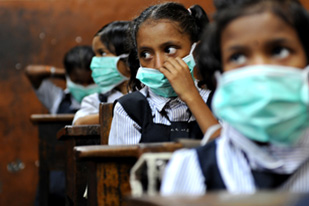China approves H1N1 vaccine
Pharmaceutical firm to mass-produce vaccine supposed to be effective with just one shot.

Both companies say their studies show one shot of vaccine is effective on
people aged three to 60. More than 3,000 people participated in the trials.
Health workers have been sceptical that a single shot is potent enough for a virus that has spread to every continent, and has killed more than 2,000 people.
But if a one-shot vaccination works, it would greatly simplify efforts to stem the spread of the influenza.
Details reviewed
The World Health Organisation says it is encouraged after reviewing the
test details from the vaccine by Sinovac.
However, experts said more results are needed from other vaccine makers to determine if one dose would be potent enough.
Australia-based CSL Laboratories should know within days whether one dose of its
vaccine, administered to volunteers in that country in late July, was enough.
 |
| The H1N1 influenza has affected every continent, killing over 2,000 people [AFP] |
“Everybody is desperately hoping that one (shot) will do because then that’s much easier to administer,” McVernon, a vaccine expert at the University of Melbourne who is involved in Australian trials of H1N1 vaccines for young children, told the Associated Press news agency.
Sinovac says it has the capacity to produce up to 30 million doses of swine flu vaccine in a year, while Hualan said it can make 160 million doses.
Quality concerns
Dr Lo Wing Lok, an infectious disease specialist and adviser to the Hong Kong government said China may not face technical problems manufacturing the vaccine but there were concerns about quality control.
“There has been a lot of problem in terms of pharmaceutical regulation in mainland China… and because of that the international scientific community is keeping a close watch on developments,” he told Al Jazeera.
“It is important that the tests can be independently verified outside China and comes with sufficient quality assurance in the manufacturing process in line with international standards before the vaccine can be exported.”
Stockpiling vaccines is China’s latest move in its approach to contain the spread of the flu in a country of 1.3 billion people with relatively limited medical resources.
The health ministry says nearly 4,000 cases of H1N1 flu have been confirmed on the mainland – none of which were fatal.
China aims to have enough vaccine for five per cent of the public by the end of the year, and although health officials have not released detailed vaccination plans, they have said health workers, public service workers and students are priority groups.
International health experts say H1N1 has not been as severe as initially feared.
At least 2,185 people have died, but most cases are mild and require no treatment.
Worries remain that a rash of new infections could overwhelm hospitals and health authorities, particularly in poorer countries.